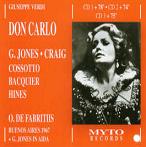With only a single Italian on board, we have a right to expect something less than an idiomatic performance. But Olivero de Fabritiis, hardly anyone’s favorite conductor, turns in a very persuasive, naturally-flowing reading of the four-act form of this masterwork (with the Queen/Eboli masking duo and a couple of other non-straight-Italian-version moments included), and there are some incredibly potent passages here. He understands the score completely and plays the one-on-one scenes just as effectively as the big moments: the Posa/Philip duet bristles with excitement, the Carlo/Elizabeth confrontation is properly complex, and the Philip/Inquisitor scene is thrilling. He keeps the third-act quartet clear and tense, and the Auto da Fé scene is very exciting. He also gets the best singing imaginable out of his odd cast.
Only Fiorenza Cossotto is vocally ideally suited to her role, and her Eboli is magnificent: She’s as suggestive in the “Veil Song” as she is wild in “O don fatale”, the latter being sung just about as well as we’re apt to hear it. The American Jerome Hines is a towering, nuanced Philip, and he and the Inquisitor, William Wildermann, really go at it in their big scene. From there it gets more complicated. The always smart but usually wayward Gwyneth Jones is caught at her best: the voice is not Italianate, but she’s solid and gets the role’s subtleties, albeit with somewhat shrill singing amid mostly controlled elegance. It’s a pity that the second verse of her little farewell to her companion is cut. The English Charles Craig was a big-voiced tenor, and he also makes up in sheer good singing what he lacks in Italian timbre as Carlo. His passion is never in doubt. Gabriel Bacquier has some problems with Posa’s high notes at first, and while his tone is never melting, he makes a fine impression; he gets the character’s nobility.
As a bonus, from the following year (1968) we get highlights from an Aida at Covent Garden with Jones and Jon Vickers, and they’re splendid and worth hearing. Both live performances are in good enough sound. No, this can’t be your only Don Carlo, but in its own way it is a very convincing, entertaining, and high-quality performance.
































